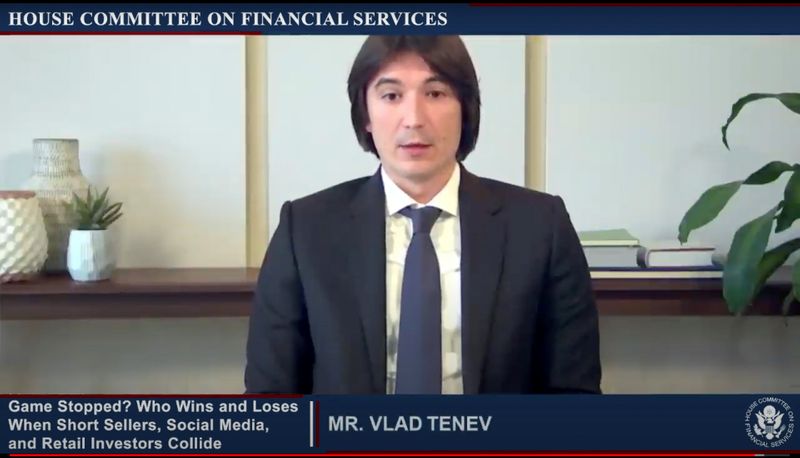By Michelle Price and Anna Irrera
WASHINGTON (Reuters) - Robinhood CEO Vlad Tenev told a congressional hearing that his decision to curb buying in some stocks such as GameStop Corp (NYSE:GME) during a period of extreme volatility was unavoidable, but industry experts said it only underscored the risks the popular trading app was willing to accept to expand its market share.
Robinhood's Jan. 28 restrictions on buying GameStop and other stocks that hedge funds had bet against drew the ire of its customers and U.S. lawmakers. They accused it of doing Wall Street's bidding by shielding the hedge funds from an army of amateur traders banding together on Reddit to take them on.
Tenev reiterated in the hearing on Thursday his prior explanation for the move, saying it was dictated not by hedge funds but by a requirement that Robinhood come up with an additional $3 billion in collateral to guarantee customer trades. He said it was an extremely rare "black swan" event caused by the unprecedented volatility.
Yet Jan. 28 had been preceded by several days of frenetic trading as amateur investors flocked to Robinhood. That should have served as a warning that the flood of orders was becoming unsustainable without setting more capital aside, market structure experts said.
Robinhood was forced to raise $3.4 billion quickly from its investors to stay in business and cover potential future collateral calls.
"Nothing I heard today suggests that Robinhood was prepared for its margin calls. No responsible broker-dealer would make abrupt, ad-hoc trading halts the cornerstone of its liquidity risk management program," said Joseph Cisewski, special counsel at Washington think-tank Better Markets.
A Robinhood spokeswoman did not provide further comment on Thursday evening.
The capital call that Robinhood faced was due to the standard two-day processing time for settling trades. Brokerages are required to post collateral with clearing-houses to guarantee a trade in case either party defaults before settlement.
Robinhood's Jan. 28 collateral call was a 10-fold jump on its Jan. 25 requirement, Tenev said. By restricting trading, it was able to slash that sum to $1.4 billion. As Robinhood already had $696 million on deposit with its clearinghouse, it transferred another $737 million to meet the call, he said.
Other major brokerages such as Charles Schwab (NYSE:SCHW) & Co and TD Ameritrade (NASDAQ:AMTD) did not restrict buying in affected stocks.
Some increased their customer margin requirements, ensuring they had sufficient funds to cover their positions. Schwab and TD, which are both owned by Charles Schwab Corp - which has much deeper pockets than Robinhood - began increasing their margin requirements for GameStop around Jan. 13.
Tenev appeared to contradict himself during the hearing, stating several times that Robinhood did not experience a liquidity crisis and that it had raised the $3.4 billion for future collateral demands, only to concede later that the trading app had to restrict buying because it did not have the $3 billion.
"The clearing house mechanism is in place... to build financial system stability. That is something we will be looking at to ensure everything functioned as intended," Securities and Exchange Commissioner Hester Peirce said in an interview last week.
ROBINHOOD SELF-CLEARING
The Depository Trust & Clearing Corp, the clearing house that called for the $3 billion, implied in written testimony that clearing brokers should be aware of their obligations.
It said they have access to its rules and methodologies, which are public and transparent, and that it provides calculators and tools that allow brokers to "monitor their risk in near real-time" and to estimate requirements for hypothetical scenarios.
Robinhood's decision in 2018 to launch its own clearing broker to process trades may have exacerbated its financial burden on Jan. 28, some market structure experts said.
The change allowed it to cut costs by eliminating its external clearing broker, which acted as a middleman between it and the clearinghouse. But that meant Robinhood was also assuming total responsibility for the capital calls in times of volatility.
The experts said it was unlikely that an experienced clearing broker would have allowed Robinhood to take on so much risk in the first place.
"Margining requirements are always a bigger deal for smaller market participants with less capitalization and fewer cash reserves," said Virginie O'Shea, CEO of finance consultancy Firebrand Research.
